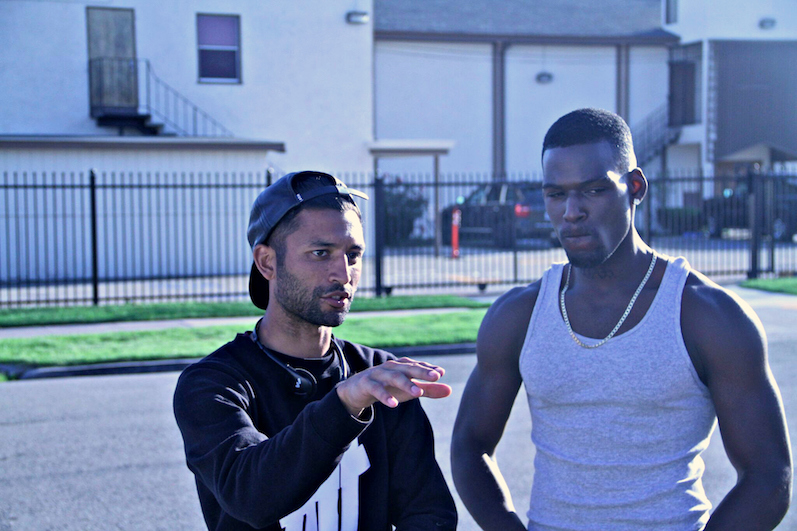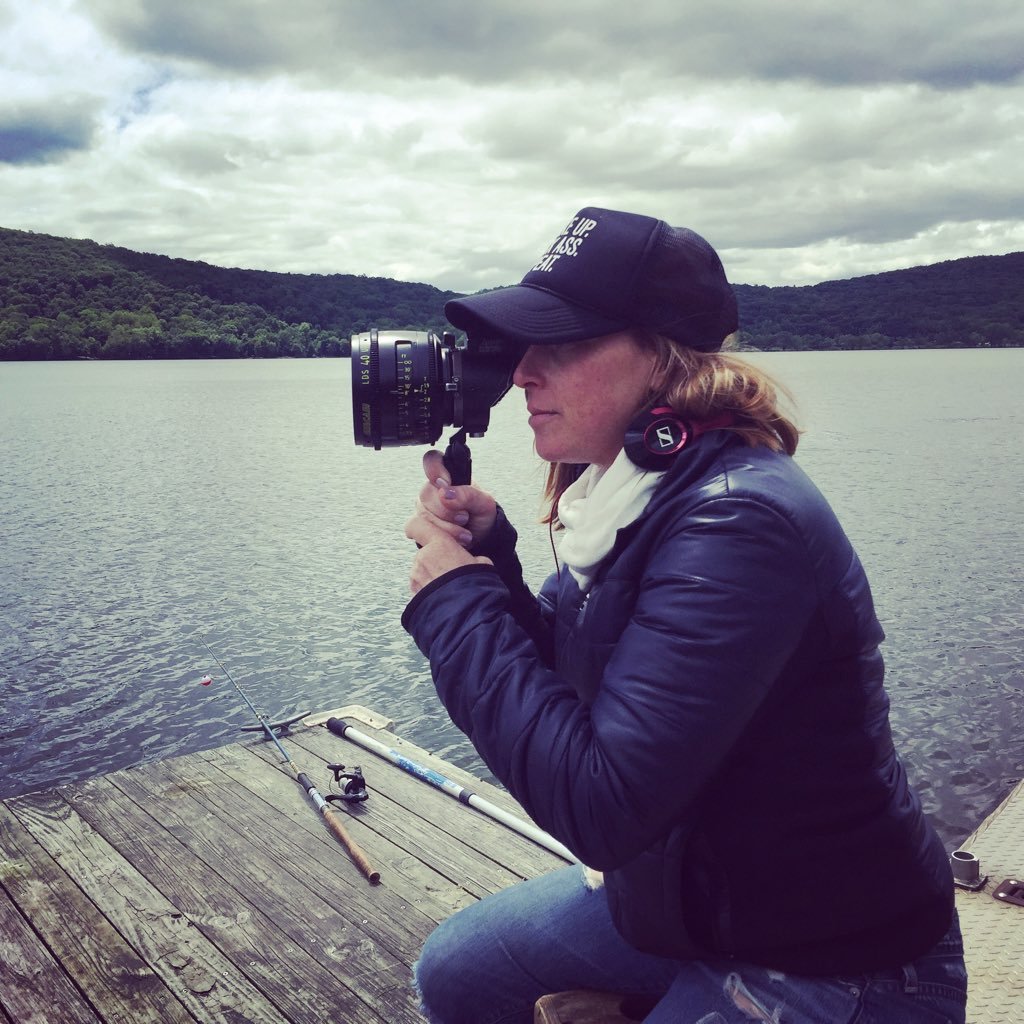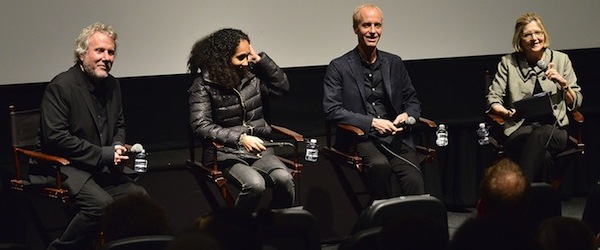As a college student studying Business Economics at UC Santa Barbara, a semester in Italy changed everything for JUSTIN TIPPING. He fell in love with Italian cinema while studying abroad in Rome, enough to change his major to Film and Media Studies. His filmmaking aspirations continued at the American Film Institute, where he directed the 2012 Student Academy Award-winning short film Nani (co-written with AFI classmate Joshua Beirne-Golden). The film and award helped land Tipping and Beirne-Golden a number of screenwriting jobs (including the upcoming Ricardo de Montreuil-directed feature Lowriders) as they worked to push forward on Tipping’s feature directorial debut: KICKS.
Kicks is a coming-of-age story centered on Brandon (Jahking Guillory), an Oakland, California teenager who finally gets a pair of his dream sneakers: Nike Air Jordan 1s. But when he’s jumped and his prized shoes get stolen, Brandon and his best friends Albert (Christopher Jordan Wallace) and Rico (Christopher Meyer) hit the streets for a dangerous mission to get back his beloved kicks. Kofi Siriboe and Mahershala Ali co-star in the film, which premiered at the 2016 Tribeca Film Festival. Kicks hits theaters on September 9 via Focus World.
We had a chance to talk with writer/director Justin Tipping about Kicks, touching on his experience moving back in with his parents during production, building lifelong connections in film school, and how much of his budget was spent on Nikes.
——
COLIN McCORMACK: The film was inspired by the time you got jumped when you were a kid and got your Nikes stolen. At what point in your life did that go from a painful memory to an inspiration for a film script?
JUSTIN TIPPING: I actually had gotten into the American Film Institute and had to show up with an idea. In trying to find my story and what I wanted to tell, and looking back on how I could maybe comment on the world we live in now because it still felt relevant, that one memory always stuck with me and had a lasting effect. That’s when – in 2009, I think – I came up with this concept.
CM: As you’re doing more and more press for the film, has it been an odd experience having to re-tell that story from your childhood, which maybe was scary or embarrassing at the time? Now you’re probably having to tell it over and over.
JT: [Laughs] You know, it’s funny but it’s also not that weird for me anymore. Because kind of the reason why I set out to make this movie and tell this story [is] because it should be talked about. I’m not embarrassed at all anymore by it. It’s different in the moment when you’re an adolescent, but now it’s just that thing that happened that made me rethink how we should think about violence and the culture of violence in the country. So no, I’m used to it now. It’s just a fact of life. I think the other important thing for me in telling the story was to remind people that it happens every day. Whether it’s over shoes or an iPhone or a jacket or a chain or something, this kind of thing happens every day. So there should be a dialogue about it.
CM: In exploring the sneaker culture of Oakland, [Kicks] reminded me of another film you wrote Lowriders, which I saw at LA Film Festival, which explored the car culture of East LA. Is that a coincidence, or is finding untapped subcultures something that interests you in particular?
JT: It definitely naturally interests me. I actually got connected to [Lowriders] because of my short that I did out of AFI, Nani, which was about a Latino kid in East LA who spray-paints and has this unlikely bond with this elderly woman and this adventure in graffiti [laughs]. I guess even that story is counterculture in its own right and a subculture that isn’t really seen on-screen that much, and characters you don’t see. So I definitely have an affinity and love for those kinds of stories. I guess I naturally gravitate towards anything in those worlds.
CM: You and your writing partner Joshua have written a lot of projects. Was Kicks always planned to be your directorial feature debut?
JT: Yes. I met Josh at AFI and we’ve been working and writing together ever since. He actually produced my first short there. It was one of those things where it was like, We could just go do [Kicks] for no money and just friends out of film school. And then after [writing] the drafts it was like, Oh, now there’s an astronaut who stalks some kids. This is probably a little bit bigger than [we planned]. But we always had that in mind that this was going to be the first thing I directed, one way or another. So screenwriting in between graduating from AFI and now was a way to make a living. And that was also a blessing because the script Kicks was what allowed me to [get screenwriting work], as a sample. It just kind of took a while to get the financing and everything together to allow me to direct the script finally.
CM: How did you end up bringing it to [producers] David Kaplan and Adele Romanski?
JT: I signed [with United Talent Agency] around the time [Nani] won the Student Academy Award and the script started going out. But David Kaplan actually started off in the mailroom at UTA and knew one of my agents at UTA. So somehow the script got passed around to him and he knew that Adele would love this kind of project, so David kind of brought us all together. That was around the time he had just premiered Short Term 12. I was like, Wow, I want to [work with him]. And he believed in the vision and didn’t want to compromise my vision, which was really important to me. It was exciting to work with someone as talented as Adele and David.
CM: I’d heard you used both a casting director and did some scouting of Bay Area youth centers to find your cast. How much extra prep was involved because you were working with so many minors? Was there a thought with the three leads to try to find some really young-looking 18-year-olds to avoid those labor constrictions?
JT: Yeah, we kind of knew we needed to exhaust all those options first. But I felt like it’s so hard to get the authenticity of the world at that age. Someone at 18 to play younger would obviously have helped the production, so we did exhaust that route of looking and seeing hundreds of kids from 18 and up. But it just never felt right. Or at least we couldn’t find whoever that [18-year-old] could have been to be the lead. But we did find the three main kids through Kim Hardin, a casting director in LA.
CM: Did you test the three of them together? Their chemistry was great. Did they have a lot of rehearsal or any [time together]?
JT: What’s kind of crazy is we couldn’t really afford to fly them out to the Bay and have rehearsal time. But I was able to see them in some chemistry reads in LA with Kim. And it was one of those things where they say 90% of directing is in casting. I just had them sit on the couch and would throw some improv things at them, and it was just like, Whoa, they are the three kids. Their chemistry just clicked immediately. And the immediate dynamic– Jahking was about 12 or 13 at the time of casting. 13 when we shot, so he was 12 when I met him and he met CJ Wallace and Chris Meyer. So in the room – Chris and CJ were 17 and he was 12 – there was this natural older-brother/younger-brother dynamic. He was the character we were looking for, and that was the dynamic of the trio that we wanted. So it worked out great. And they all became really good friends on-set, so even though we didn’t have weeks of rehearsal to go over everything, they were already who they were, and I was already thinking of ways to let their personalities shine through in the script.
CM: I heard the Amblin films of the ‘80s were partly an inspiration for the script. It’s interesting now because Amblin-nostalgia seems to be really prevalent lately with Stranger Things and Midnight Special.
JT: [Laughs] Right.
CM: And at the same time those Amblin films were pretty much all white kids in suburbs. Were there other coming-of-age films you watched growing up or that inspired you later that were more representative of the area you grew up in or people you grew up with?
JT: Yeah, it’s funny I kind of rediscovered film later in my twenties and in college. Before shooting Kicks, I [watched films] like Juice, and even Boyz N the Hood, but those kids are older and it doesn’t have the same adventure, Stand By Me-type [feeling].
CM: They’re all about to graduate high school.
JT: Right, so it’s a different kind of coming-of-age. Andrea Arnold’s Fish Tank had a big influence on me. That felt authentic and gritty and real. There was definitely also a lot of European influence. But I can’t point directly to other coming-of-age stories other than Fish Tank as one that I was definitely obsessed with.
CM: How was it filming in the town you grew up in? Was that fun, bizarre, difficult?
JT: It was both really exciting and a little nerve-wracking. Just because I wanted to make the movie in the Bay Area where I grew up, the world I knew, and with that I wasn’t going to go out of state to get the tax incentives to save money or anything. But in other ways I thought I was saving money because I had a bunch of friends and family and free resources. My friends had grown up and some of them worked for the Fire Department and they’d help me go scout locations I needed. Some of that naturally benefited the film and was very helpful. And even– I mean, I had to move back home! [Laughs] I moved back home to my parents’ house four months before pre-production started to start finding other kids. So if I didn’t have that luxury it would have been even harder to cast. And a lot of the reception of the few people who have seen it that are from the Bay Area, that’s the most rewarding part so far. They’re able to say, Wow I can’t believe it! I saw this street and that street, and this is where we grew up. That is really rewarding for me to hear as a filmmaker.
CM: So you haven’t done a big screening in Oakland yet?
JT: We’ve done smaller ones for cast and crew that are also in Oakland. The kid who plays young Jeremiah [Michael Smith Jr.], him and his entire family got to see it at the Grand Lake in Oakland as a little private screening. Watching their reaction and being able to see it with them was amazing. They’re very excited and that makes us all excited.
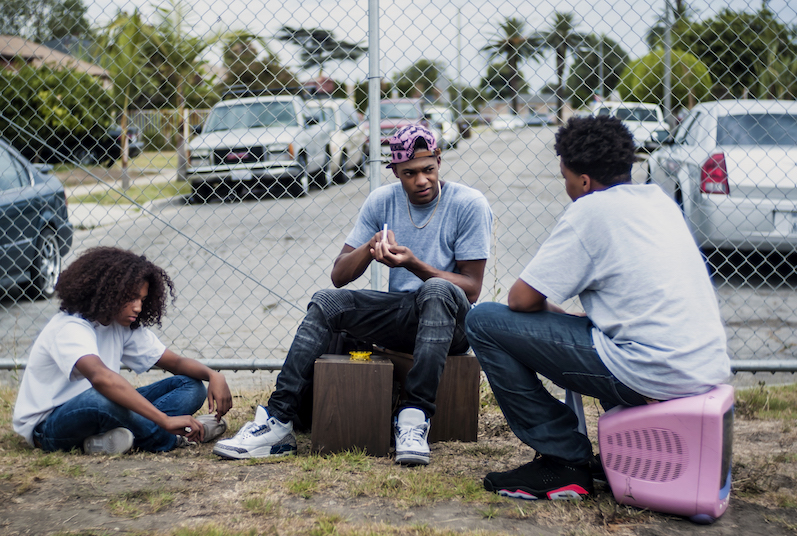
CM: From a production standpoint, were there ever any rights or clearance issues with Nike? Their logo and brand is so front-and-center in the film, did you have to get them on-board?
JT: Actually none of the marketing materials – the trailers or promotion of the movie – we can’t use the logo. I don’t really know the specifics, all I could speak to was, we never reached out and they never said anything. Because it’s kind of this fair use issue. I don’t think that they’d ever endorse [the movie], but at the same time they can’t really make us stop or not use the shoe.
CM: You’re not disparaging the brand or anything, obviously.
JT: Right, yeah. I think. [Laughs]
CM: You had mentioned you met [your co-writer] Josh at AFI. A lot of times when talking about film school you often hear it’s really the relationships and connections you make that are sometimes more important than the academic aspects of the education. Are there other classmates from AFI that you’ve continued to work with, or is there a support group even if you don’t work on each other’s films?
JT: Yeah, definitely. The production designer of Kicks I met at AFI. One of the editors I met at AFI. So it wasn’t just Josh, there are definitely others that I’ve worked with and probably will continue to work with moving forward. There’s definitely a tight-knit community of just, Hey, can you come watch the rough cut and give your feedback? Things like that that we’ve continued to do– coming out of there. [AFI] even told us from the beginning, It’s really important that you find your creative partners and build relationships now, because you might work with them for the rest of your life.
CM: Does yours and Josh’s writing process differ from when you’re on writer-for-hire assignments versus when you’re writing something like Kicks, which you know you’ll be directing?
JT: Yeah it’s pretty different, I’d say. In the sense that when we’re writing Kicks it’s more like, “This is what I want and this is the world I know.” And [Josh] will question, “Is that really best for the story? Should this happen?” And there’s a dialogue if it’s for me to direct, and it’s definitely a different process. Because I already know what I want. And I’ve seen that writing for other directors and executives, we’ll both sit down and crack, Okay, so what do they want? It might not necessarily be what I would do if I was directing that movie, but you have to figure out how to get the best version of the story or whatever the other director or exec is looking for. So in that sense, there’s definitely a difference. But even writing for other people, sometimes in the process it helps, if we can’t crack it, for Josh to say, “Just imagine if you were going to direct it. What would you do?” And I’m like, “Okay if I [was director], we might do this.” And that might inform another idea on how to give the executive or director what they want.
CM: Have you been tied up with promotion for Kicks or are you guys working on your next project, be it your next directorial effort or something new you guys have been hired to write?
JT: Right now we’re in the thick of promoting Kicks. Since Tribeca we’ve had lots and lots of meetings, which is a really great thing and met pretty much everywhere around town. So we’re just trying to figure out what the next thing for me to direct is. We have a couple ideas of our own that we just haven’t cracked. And then there’s talks for possibly gigging on another script. But we haven’t figured that out quite yet. We’ve also been looking into television as well. It’s all exciting, and I think no matter what we’ll still continue to try to make films like Kicks that speak to how we live now. Hopefully we’ll get to make another one. [Laughs]
CM: Has there been a genre or have you noticed a pigeonholing that people want to do to you? Or are you exploring genres and formats across the board?
JT: I think there’s a natural reaction to see me as the hip-hop/urban guy. And that’s totally fine, I am that kind of guy. But there’s definitely other genres and bigger projects and bigger worlds that I want to explore and we’re definitely ready to write as writers. Even Lowriders felt like a bigger world with this car competition aspect. We’re even talking, for me I think District 9 or Children of Men would be a good example of something that speaks about society that’s wrapped in a genre that can still be entertaining and Trojan Horse your ideas in. That’s something we’ve been talking a lot about as the next step. Even things like Nightcrawler, that can be an immersive subculture and a critique of violence in America, but it’s still kind of a genre [film] because it’s a period piece in a way. I think that’s also another path to continue to branch out and tell different stories but have interesting themes still come through.
CM: Just one last quick question before we go: How much of your budget for Kicks was spent on shoes?
JT: [Laughs] Good question. Not that much, actually! No well, that’s not true. The majority of the budget in our wardrobe department went to the astronaut. So, fun fact, since we were struggling to get the shoes in and dress everybody in the movie, I was like, “I’m going to buy the shoes for the film and own them.” So I did.
CM: Were those the ones you wore in your cameo?
JT: Yeah. And then I was like, “Oh crap, I gotta buy two pairs.” [Laughs] So I dug deep into my pockets, but it was an investment for the film and maybe myself to remember the movie experience by. That was the most meta-film-reflexive moment ever though, because in that scene you’re describing I was on BART [train] holding the camera for the POV of the character Brandon looking at his shoes, and then he looks up and sees myself [Tipping’s cameo character] wearing the same shoes. I was like, This is blowing my mind right now! [Laughs] Very meta film geek.
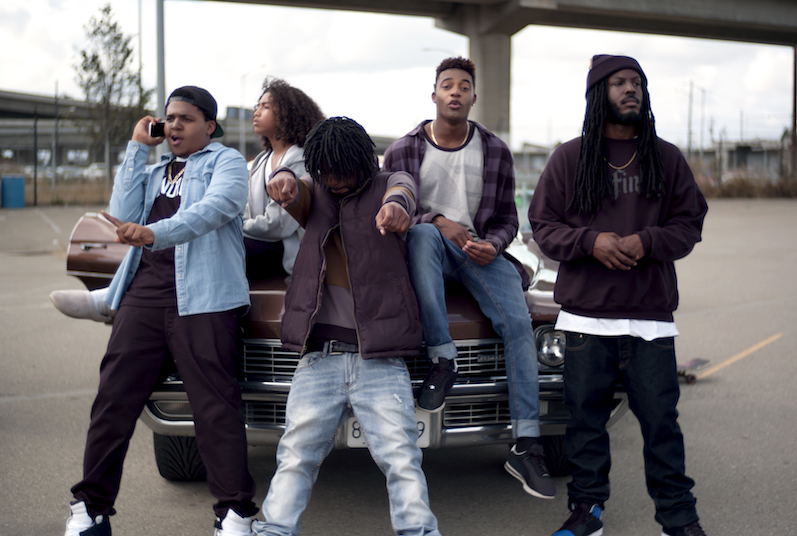
__
Thanks to Justin Tipping for chatting with us about KICKS. Learn more at the film’s official website or get updates on Twitter, Facebook, or Instagram.
If you’re an independent filmmaker or know of an independent film-related topic we should write about, email blogadmin@sagindie.org for consideration.

